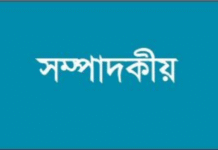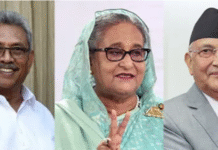The strength of a nation state lies in the unity of its people. Differences of opinion are a part of democracy, but this does not obstruct unity. Debate and conflict are not the same. There are times when unity is imperative in the interests of the nation, such as over the issues of independence and sovereignty.
Foreign minister AH Mahmud Ali told a press conference that the Rohingyas, victims of hellish brutality, had created an ‘unprecedented crisis’ for Bangladesh. In other words, Bangladesh never had to tackle such a crisis before. Not a single person in Bangladesh will differ.
Finance minister Abul Mal Abdul Muhith, the oldest member of prime minister Sheikh Hasina’s cabinet, told the media that this is an indirect attack on Bangladesh by Myanmar. Agreeing wholly with him, I would add that this is no longer indirect, as Myanmar’s helicopters are repeatedly violating Bangladesh’s air space. This is direct.
The Rohingya refugee crisis has created a multidimensional crisis for Bangladesh. Verbal condemnation from the international community does not resolve the problem. Nor will it be resolved by writing emotion-laden columns and touching reports, or nationwide human chains and intellectual rhetoric on talk-shows. The roots of the problem are deep and widespread. These will not be uprooted so easily.
The hundreds of thousands of Rohingyas, driven from their homeland, losing their hearth, homes and families, have been given shelter in Bangladesh on humanitarian grounds. As human beings, we must provide them with food, water, and medicines and the basics of survival. The government is doing that to the best of its ability. Other countries have started sending in relief. Relief has arrived from India, Indonesia and Turkey and more is likely to arrive from other countries and agencies. Distributing relief to the distressed is just one aspect of this critical time. It is not a solution to this multidimensional problem.
The United Nations has taken a firm stance about the Rohingya crisis. The UN secretary general Antonio Guterres, the UN high commissioner for human rights Zeid Ra’ad Al Hussein, UN high commissioner for refugees Fillipo Grandi, and the leaders of other agencies and countries, have expressed their concern about the refugee crisis and condemned the Myanmar government. The ongoing event in UN words is ‘textbook ethnic cleansing’.
Canadian prime minister Justin Trudeau is a good man, like his father the former prime minister Trudeau who had supported us during our liberation war. Justin Trudeau made a phone call to Myanmar’s leader Suu Kyi, asking her to halt the brutality. His foreign minister has declared that no visas would be issued to citizens of Myanmar. West Bengal chief minister Mamata Banerjee has expressed sympathy for the Rohingyas. All this strengthens our moral stance, but does not solve the problem. There are multidimensional obstacles that hinder a solution. Unless these obstacles are identified and unless Bangladesh has the capacity to overcome them, the crisis will deepen further.
No problem of the state is outside politics. Whether it is a social problem, economic problem or even a cultural problem, there is politics everywhere. The European Union, the US, UK and most countries are condemning Myanmar and praising Bangladesh for providing shelter to the refugees. But our regret is elsewhere. And we prefer to remain silent about that.
It is hard to understand the intricacies of this world. The US, UK and the countries of the European Union had expressed dissatisfaction over the 5 January 2014 election. They said it was not a credible election. But Russia and China were quite satisfied with the election and affirmed their stand by the government. Now, almost three years hence, we watch in astonishment as China and Russia have moved away from Bangladesh and stand by the military-backed Myanmar government.
We often get to meet the diplomats of various countries on various occasions. The previous Russian ambassador Alexander Nikolaev was a friend to the civil society and we would have long talks. We would discuss art, literature and culture. He seemed to be a well-wisher of Bangladesh, a friend. Common folk like us do not have the acumen to understand that his interest lay in Rooppur and in selling us outdated military equipment. We only see the beauty of an elephant’s tusks, we do not see its dangers.
China is our ‘close friend’, Maulana Bhasani would say back in the day. Our government leaders vehemently affirm this today. It’s no problem if we forget China’s role in 1971. China does not see the need to understand democratic politics and is quite eager to establish ties with military autocrats. Trade and commerce is their priority. They will construct roads in Bangladesh, dumps war equipment on us and sell their cheap low-quality products to the market of our 160 million people.
That is China’s objectives. Their close ties are with Myanmar, with whom they share a border. China has close bonds with Pakistan, with whom they also share a border. Bangladesh has no border with China.
In 1971 Maulana Bhasani had written a letter to China’s Chairman Mao and premier Chou En Lai, saying that they were making an error in supporting the Pakistan military junta against the persecuted people of Bangladesh. He said, if you do support the Bengali’s independence struggle, this will prove that you are not a friend of the freedom-seeking people of the world. Chairman Mao and Chou En Lai did not heed to Maulana Bhasani’s words. They voted against Bangladesh in the UN Security Council.
There are a number of pro-China parties in the 14-party alliance at present. The leaders of these parties have visited Beijing far more times that they have visited their own village homes in Bangladesh. The Chinese government has the propensity to invite all sorts of leaders to their countries the year round. These leaders are quite pleased. I haven’t seen a single pro-China leader of the government make any clear statement about the Rohingya issue.
In a write-up published in the press recently, special emissary of the prime minister, former president Hussain Muhammed Ershad called upon the ‘whole world’ to ‘stand’ by the Rohingyas. China and Russia are included in the ‘whole world’. If he could convince those two countries to put pressure on Myanmar, that would be an achievement. A lengthy essay in the newspaper won’t resolve the crisis.
Then there a special kind of opposition party in Bangladesh that is neither in the parliament, nor on the streets. During the day the leaders spend some time in the party office, read out well-enunciated statements to the media and then go home.
The statements issued by the BNP leaders on the Rohingya crisis so far have displayed their rhetoric, not their responsibility. Of course, the government was inconsiderate and lacking in sense to have obstructed BNP from distributing relief to the Rohingyas. This is not the time for conflict between parties. If they do not understand this simple matter, then how can people expect anything from them?
The nation is facing a crisis in the true sense of the word. The Myanmar government is not only oppressing the Rohingyas, but is also creating enmity with Bangladesh. The world may be condemning Suu Kyi, but it is the head of the Myanmar army, Min Aung Hliang, who is basically responsible for the annihilation of the Rohingyas. In a statement yesterday he said that the Muslim Rohingyas in Rakhine were no a recognized race, they were Bangalis. There is an international probe being conducted against General Min at present. He is called the Butcher of Burma. His statement is a matter of concern. It is imperative for all parties, groups and quarters in Bangladesh to put aside al differences and unite in an effort to send the Rohingyas back to their own country. This is the pressing need of the day.
Source: Prothom Alo









